河北省唐山一中2017-2018学年高二下册期中考试英语试题有答案
河北省唐山市第一中学2017-2018学年高二下学期期中考试英语试卷
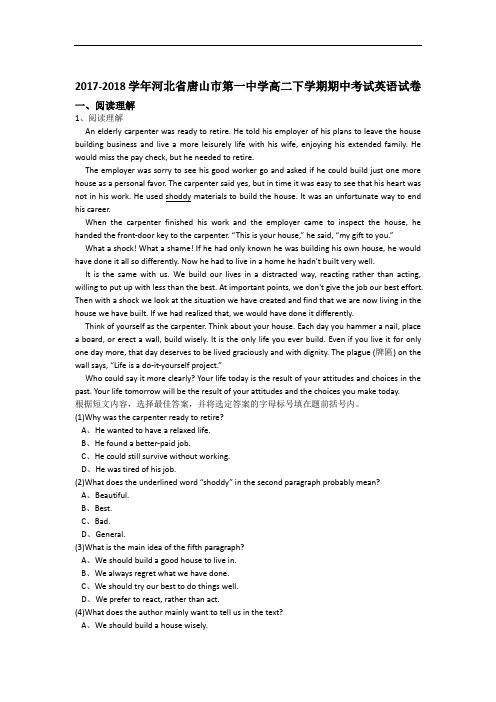
2017-2018学年河北省唐山市第一中学高二下学期期中考试英语试卷一、阅读理解1、阅读理解An elderly carpenter was ready to retire. He told his employer of his plans to leave the house building business and live a more leisurely life with his wife, enjoying his extended family. He would miss the pay check, but he needed to retire.The employer was sorry to see his good worker go and asked if he could build just one more house as a personal favor. The carpenter said yes, but in time it was easy to see that his heart was not in his work. He used shoddy materials to build the house. It was an unfortunate way to end his career.When the carpenter finished his work and the employer came to inspect the house, he handed the front-door key to the carpenter. “This is your house,” he said, “my gift to you.”What a shock! What a shame! If he had only known he was building his own house, he would have done it all so differently. Now he had to live in a home he hadn't built very well.It is the same with us. We build our lives in a distracted way, reacting rather than acting, willing to put up with less than the best. At important points, we don't give the job our best effort. Then with a shock we look at the situation we have created and find that we are now living in the house we have built. If we had realized that, we would have done it differently.Think of yourself as the carpenter. Think about your house. Each day you hammer a nail, place a board, or erect a wall, build wisely. It is the only life you ever build. Even if you live it for only one day more, that day deserves to be lived graciously and with dignity. The plague (牌匾) on the wall says, “Life is a do-it-yourself project.”Who could say it more clearly? Your life today is the result of your attitudes and choices in the past. Your life tomorrow will be the result of your attitudes and the choices you make today.根据短文内容,选择最佳答案,并将选定答案的字母标号填在题前括号内。
英语(高二期中考试英语试题答案)
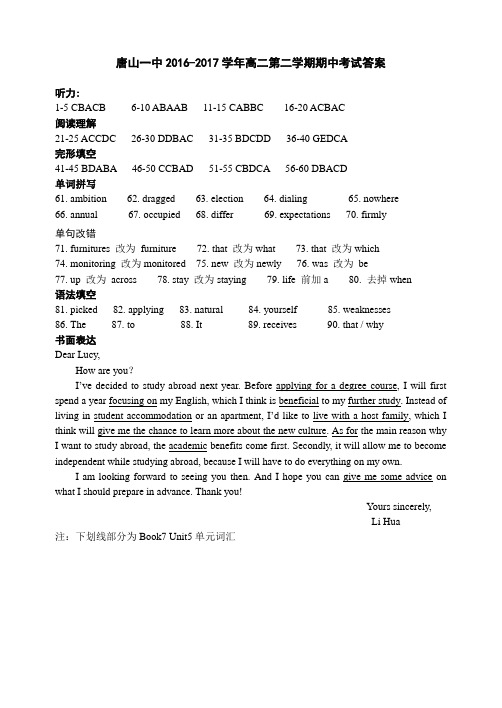
唐山一中2016-2017学年高二第二学期期中考试答案听力:1-5 CBACB 6-10 ABAAB 11-15 CABBC 16-20 ACBAC阅读理解21-25 ACCDC 26-30 DDBAC 31-35 BDCDD 36-40 GEDCA完形填空41-45 BDABA 46-50 CCBAD 51-55 CBDCA 56-60 DBACD单词拼写61. ambition 62. dragged 63. election 64. dialing 65. nowhere66. annual 67. occupied 68. differ 69. expectations 70. firmly单句改错71. furnitures 改为furniture 72. that 改为what 73. that 改为which74. monitoring 改为monitored 75. new 改为newly 76. was 改为be77. up 改为across 78. stay 改为staying 79. life 前加a 80. 去掉when语法填空81. picked 82. applying 83. natural 84. yourself 85. weaknesses86. The 87. to 88. It 89. receives 90. that / why书面表达Dear Lucy,How are you?I’ve decided to study abroad next year. Before applying for a degree course, I will first spend a year focusing on my English, which I think is beneficial to my further study. Instead of living in student accommodation or an apartment, I’d like to live with a host family, which I think will give me the chance to learn more about the new culture. As for the main reason why I want to study abroad, the academic benefits come first. Secondly, it will allow me to become independent while studying abroad, because I will have to do everything on my own.I am looking forward to seeing you then. And I hope you can give me some advice on what I should prepare in advance. Thank you!Yours sincerely,Li Hua注:下划线部分为Book7 Unit5单元词汇。
河北省唐山一中2019-2020学年高二下学期期中考试英语试题答案

唐山一中高二年级第二学期期中考试英语答案第一部分:听力(每小题1.5分,满分30分)1—5 ABABC 6—10 BBAAB 11—15 CACAC 16—20 ABBCA第二部分:阅读理解(共两节,每题2分,满分40分)21—25 DACBB 26—30 CDDAB 31—35 CBDBA 36—40 EDBGC第三部分:第一节完形填空(每小题1.5分,满分30分)41—45 BCADC 46—50 CBADC 51—55 DABCA 56—60 BABDC第二节:单词拼写(每小题1分,满分10分)61. compromises 62. superior 63. justice 64. conveniently 65. applying 66. distinguishes 67. accompanied 68. classified 69. Customs 70. voluntary第三节:单句语法填空(每小题1.5分,满分15分)71. ambitious 72. occupied 73. Unfortunately 74. for 75. in76. to 77. as 78. the 79. that 80. whose第四部分:书面表达(25分)参考答案:Words can’t describe how grateful the family is to Langlois,” Mr. Smith said.“She’s my son’s angel,” he said. “I tha nk her every day. She is so kind that she rescued my son from the garbage container. And we have gained our faith in humanity again.” And the family decided not to let Micheal walk home by himself because they are afraid the bad men hurt him again.The family contacted police,who are investigating.Micheal is not able to talk to the police what happened to him or who did this to him. The family is appealing to anyone who might have seen anything. The family are sure there are many kind people in society, where people will take good care of all the children, whether they are intellectually disabled or not. The police said they would try their best to find the bad men who carried out such terrible actions and punish them.。
河北省唐山第一高中-学年高二下学期期中英语试题word版(原卷版解析版)(无听力音频,无文字材料)

2019-2020学年河北省唐山一中高二(下)期中英语试卷
第一部分听力(共两节,满分7.5分)
该部分分为第一、第二两节.
注意:回答听力部分时,请先将答案标在试卷上.听力部分结束前,你将有两分钟的时间将你的答案转涂智学网答题卡上.
第一节(共5小题;每小题1.5分,满分7.5分)
听下面5段对话.每段对话后有一个小题,从题中所给的A、B、C三个选项中选出最佳选项,并标在试卷的相应位置.听完每段对话后,你都有10秒钟的时间来回答有关小题和阅读下一小题.每段对话仅读一遍.
8.(1)When is the man supposed to check in?
A.At 10:30 a.m.
B.At 10:00 a.m.
C.At 9:30 a.m.
(2)Where is the man leaving for?
A.London.
B.Paris.
C.Scotland.
(3)Why does the man feel nervous?
河北省唐山一中高二英语下学期期中试题卷
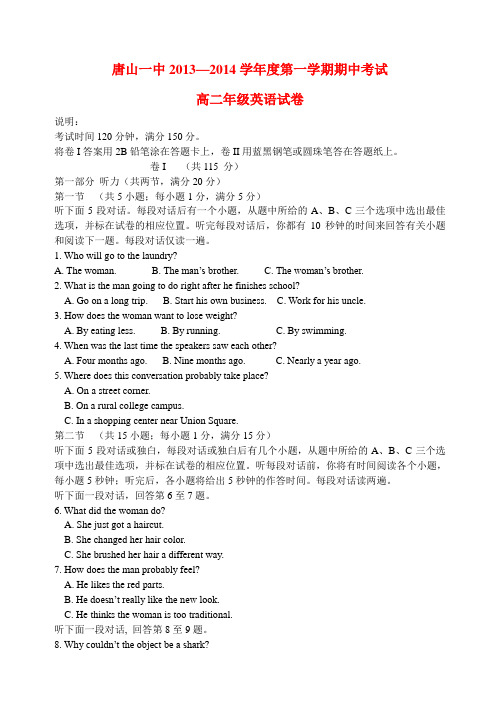
唐山一中2013—2014学年度第一学期期中考试高二年级英语试卷说明:考试时间120分钟,满分150分。
将卷I答案用2B铅笔涂在答题卡上,卷II用蓝黑钢笔或圆珠笔答在答题纸上。
卷I (共115 分)第一部分听力(共两节,满分20分)第一节(共5小题;每小题1分,满分5分)听下面5段对话。
每段对话后有一个小题,从题中所给的A、B、C三个选项中选出最佳选项,并标在试卷的相应位置。
听完每段对话后,你都有10秒钟的时间来回答有关小题和阅读下一题。
每段对话仅读一遍。
1. Who will go to the laundry?A. The woman.B. The man’s brother.C. The woman’s brother.2. What is the man going to do right after he finishes school?A. Go on a long trip.B. Start his own business.C. Work for his uncle.3. How does the woman want to lose weight?A. By eating less.B. By running.C. By swimming.4. When was the last time the speakers saw each other?A. Four months ago.B. Nine months ago.C. Nearly a year ago.5. Where does this conversation probably take place?A. On a street corner.B. On a rural college campus.C. In a shopping center near Union Square.第二节(共15小题;每小题1分,满分15分)听下面5段对话或独白,每段对话或独白后有几个小题,从题中所给的A、B、C三个选项中选出最佳选项,并标在试卷的相应位置。
最新-河北省唐山市2018学年高二英语下学期期中试题 精品

河北省唐山市2018-2018学年高二英语下学期期中试题第一部分:听力(共两节,满分30分)第一节:(共5小题;第小题1.5分,满分7.5分)听下面5段对话。
每段对话后有一个小题,从题中所给的A、B、C三个选项中选出最佳答案,并标在试卷的相应位置。
听完每段对话后,你都有10秒钟的时间来回答有关小题和阅读下一小题。
每段对话仅读一遍。
1. What can we learn from the conversation?A. John is going to give a speech.B. John won’t come to the meeting.C. The woman doubts whether John will come.2. What are the speakers discussing?A. A book by a new author.B. A book they have both read.C. A book by an author they both know.3. Which is the woman going to choose next year?A. Extra sport.B. Cooking.C. Art.4. How is the woman getting along with her piano lessons?A. She is tired of them.B. She is making progress.C. She wants to give them up.5. Why did Mr. Green knock the girl down?A. He was driving fast.B. He didn’t see the girl.C. He was drunk.第二节(共15小题:每小题1.5分,满分22.5分)请听下面5段对话。
每段对话后有几个小题,从题中所给出的A、B、C三个选项中选出最佳选项,并标在试卷的相应位置。
2017-2018学年度第二学期期中考试高二英语试卷(附答案)

2017-2018学年度第二学期期中考试高二英语试卷时间:120分钟满分120分第I卷选择题(共85分)第一部分:听力(共两节,满分20分)第一节(共5小题;每小题1分,满分5分)听下面5段对话。
每段对话后有一个小题,从题中所给的A、B、C三个选项中选出最佳选项,并标在试卷的相应位置。
听完每段对话后,你都有10秒钟的时间来回答有关小题和阅读下一小题。
每段对话仅读一遍。
1. How did the man find the lecture?A. Good.B. Boring.C. Average.2. What will Susan do very soon?A. Leave Beijing.B. Go to Beijing.C. Take a job in Beijing.3. What is the relationship between the speakers?A. Manager and secretary.B. Taxi driver and passenger.C. Customer and waiter.4. Where does the conversation probably take place?A. In an office.B. At home.C. In the street.5. How does the man think the woman plays the piano?A. Worse than him.B. Better than him.C. As well as him.第二节(共15小题;每小题1分,满分15分)听下面5段对话或独白。
每段对话或独白后有几个小题,从每题所给的A、B、C三个选项中选出最佳选项,并标在试卷的相应位置。
听每段对话或独白前,你将有时间阅读各个小题,每小题5秒钟;听完后,各小题将给出5秒钟的作答时间。
每段对话或独白读两遍。
听第6段材料,回答第6、7题。
2017-2018学年高二10月月考英语试卷 含解析
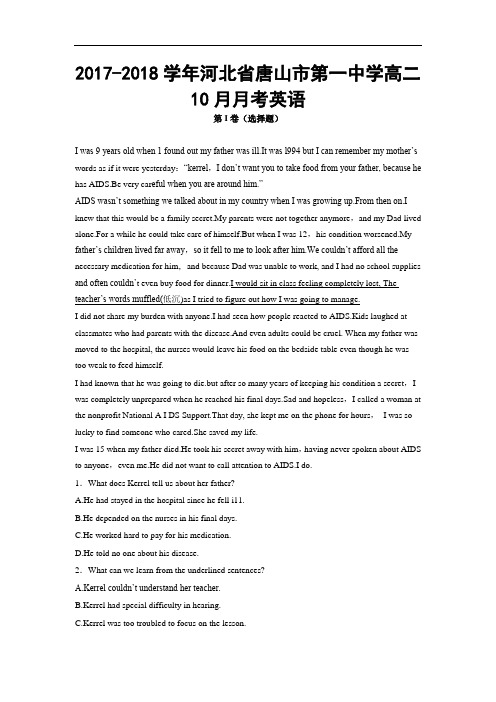
2017-2018学年河北省唐山市第一中学高二10月月考英语第I卷(选择题)I was 9 years old when 1 found out my father was ill.It was l994 but I can remember my mother’s words as if it were yesterday:“kerrel,I don’t want you to take food from your father, because he has AIDS.Be very car eful when you are around him.”AIDS wasn’t something we talked about in my country when I was growing up.From then on.I knew that this would be a family secret.My parents were not together anymore,and my Dad lived alone.For a while he could take care of himself.But when I was 12,his condition worsened.My father’s children lived far away,so it fell to me to look after him.We couldn’t afford all the necessary medication for him,and because Dad was unable to work, and I had no school supplies and often couldn’t even buy food for dinner.I would sit in class feeling completely lost, The teacher’s words muffled(低沉)as I tried to figure out how I was going to manage.I did not share my burden with anyone.I had seen how people reacted to AIDS.Kids laughed at classmates who had parents with the disease.And even adults could be cruel. When my father was moved to the hospital, the nurses would leave his food on the bedside table even though he was too weak to feed himself.I had known that he was going to die.but after so many years of keeping his condition a secret,I was completely unprepared when he reached his final days.Sad and hopeless,I called a woman at the nonprofit National A I DS Support.That day, she kept me on the phone for hours,I was so lucky to find someone who cared.She saved my life.I was 15 when my father died.He took his secret away with him,having never spoken about AIDS to anyone,even me.He did not want to call attention to AIDS.I do.1.What does Kerrel tell us about her father?A.He had stayed in the hospital since he fell i11.B.He depended on the nurses in his final days.C.He worked hard to pay for his medication.D.He told no one about his disease.2.What can we learn from the underlined sentences?A.Kerrel couldn’t understand her teacher.B.Kerrel had special difficulty in hearing.C.Kerrel was too troubled to focus on the lesson.D.Kerrel was too tired to hear her teacher’s words.3.Why did Kerrel write the passage?A.To tell people about the sufferings of her father.B.To show how little people knew about AIDS.C.To draw people’s attention to AIDS.D.To remember her father.【答案】1.D2.C3.C【解析】1.细节理解题。
英语-河北省唐山一中2017-2018学年高二下学期期中考试试题
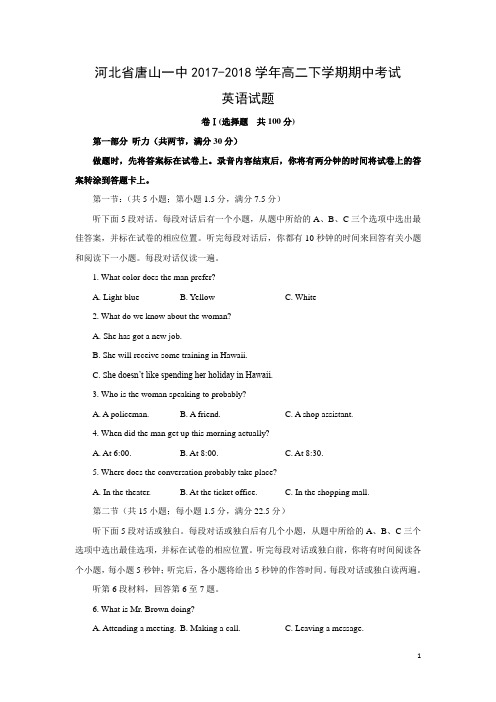
河北省唐山一中2017-2018学年高二下学期期中考试英语试题卷Ⅰ(选择题共100分)第一部分听力(共两节,满分30分)做题时,先将答案标在试卷上。
录音内容结束后,你将有两分钟的时间将试卷上的答案转涂到答题卡上。
第一节:(共5小题;第小题1.5分,满分7.5分)听下面5段对话。
每段对话后有一个小题,从题中所给的A、B、C三个选项中选出最佳答案,并标在试卷的相应位置。
听完每段对话后,你都有10秒钟的时间来回答有关小题和阅读下一小题。
每段对话仅读一遍。
1. What color does the man prefer?A. Light blueB. YellowC. White2. What do we know about the woman?A. She has got a new job.B. She will receive some training in Hawaii.C. She doesn’t like spending her holiday in Hawaii.3. Who is the woman speaking to probably?A. A policeman.B. A friend.C. A shop assistant.4. When did the man get up this morning actually?A. At 6:00.B. At 8:00.C. At 8:30.5. Where does the conversation probably take place?A. In the theater.B. At the ticket office.C. In the shopping mall.第二节(共15小题;每小题1.5分,满分22.5分)听下面5段对话或独白。
每段对话或独白后有几个小题,从题中所给的A、B、C三个选项中选出最佳选项,并标在试卷的相应位置。
河北省唐山一中2017-2018学年高一下学期期中考试英语试题 Word版含答案
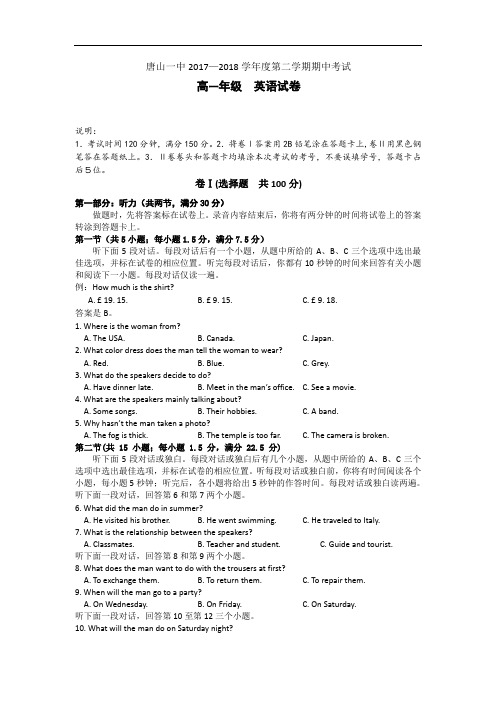
唐山一中2017—2018学年度第二学期期中考试高一年级英语试卷说明:1.考试时间120分钟,满分150分。
2.将卷Ⅰ答案用2B铅笔涂在答题卡上,卷Ⅱ用黑色钢笔答在答题纸上。
3.Ⅱ卷卷头和答题卡均填涂本次考试的考号,不要误填学号,答题卡占后5位。
卷Ⅰ(选择题共100分)第一部分:听力(共两节,满分30分)做题时,先将答案标在试卷上。
录音内容结束后,你将有两分钟的时间将试卷上的答案转涂到答题卡上。
第一节(共5小题;每小题1.5分,满分7.5分)听下面5段对话。
每段对话后有一个小题,从题中所给的A、B、C三个选项中选出最佳选项,并标在试卷的相应位置。
听完每段对话后,你都有10秒钟的时间来回答有关小题和阅读下一小题。
每段对话仅读一遍。
例:How much is the shirt?A. £ 19. 15.B. £ 9. 15.C. £ 9. 18.答案是B。
1. Where is the woman from?A. The USA.B. Canada.C. Japan.2. What color dress does the man tell the woman to wear?A. Red.B. Blue.C. Grey.3. What do the speakers decide to do?A. Have dinner late.B. Meet in the man’s office.C. See a movie.4. What are the speakers mainly talking about?A. Some songs.B. Their hobbies.C. A band.5. Why hasn’t the man taken a photo?A. The fog is thick.B. The temple is too far.C. The camera is broken.第二节(共 15 小题;每小题 1.5 分,满分 22.5 分)听下面5段对话或独白。
2017-2018学年河北省唐山市玉田县高二下学期期中考试英语试题 扫描版+听力
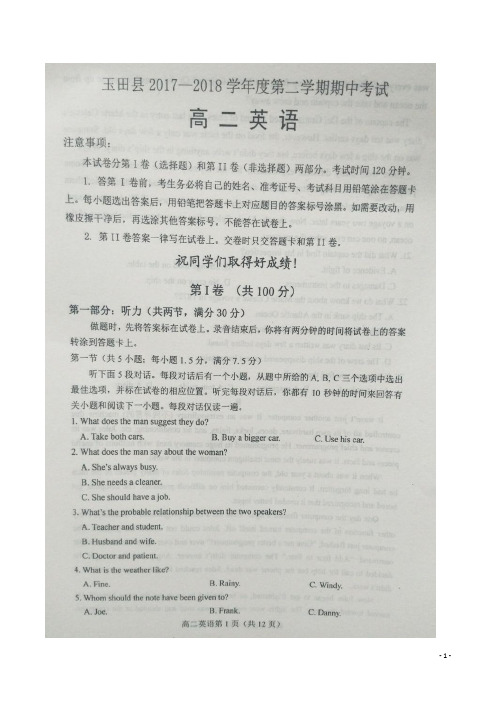
玉田县2017—2018学年度第二学期期中考试高二英语参考答案听力:1-5 CACBA 6-7 AC 8-9 BA 10-12 BBC 13-16 BCAC 17-20 ABBC阅读理解:21-23 DBB 24-27 DACC 28-31 BACD 32-35 ADCB 36-40 DFACE完形填空:41-45 ADCBA 46-50 ABCAD 51-55 DCABC 56-60 BDDCB语法填空:61. is celebrated 62. Its 63. who/that 64. by 65. to join 66. the67. absolutely 68. whoever 69. when/as 70. difference短文改错:setbook, you would read an exciting story. Tang seng and his three companions went throughwillexperiences to/forordinary people. They made the long and hard journey westwards to achieve their dream. Theaalso was called Sun wukong, managed to fight against all kinds ofwho或difficulties. Therefore, the Monkey King as a symbol of being bravery and determined isbraveus well and/soyou can learn more about Chinese culture from this book.书面表达:One possible version:Dear Miss Melina and classmates,I am much honored to have the opportunity to make a welcome speech on behalf of my classmates. First of all, let’s extend our warmest welcome to Miss Melina.Our class consists of 40 students, including 20 boys and 20 girls, all of whom are working hard at their lessons in order to achieve success in our future career. We have been doing all we can to have a good command of English, but we do feel that we still have a long way to go. So we hope that your instructions will help us a lot in our learning. I suggest that we organize more group activities in class so that everybody gets a chance to express himself in English, through which we can improve our spoken English. Besides, we expect to know more about the western culture to help us in English learning.Thank you.。
17—18学年下学期高二期中考试英语试题(附答案)(2)

2017—2018学年第二学期第一次质量检测高二英语试题第一卷第一部分听力(共两节,满分30 分)第一节(共5小题;每小题1.5分,满分7.5分)听下面5段对话。
每段对话后有一个小题,从题中所给的A、B、C三个选项中选出最佳选项,并标在试卷的相应位置。
听完每段对话后,你都有10秒钟的时间来回答有关小题和阅读下一小题。
每段对话仅读一遍。
1.Which sport does the man like?A.Boating.B. Skiing.C. Swimming.2.How does the woman keep fit and slim?A.She often does some sports.B. She has a balanced diet.C. Both A and B.3.Why does the woman come to the man’s flat?A.To ask for help.B. To visit her friend.C. To say “hello”.4.What does the woman prefer to do?A. Listen to the radio.B. Go shopping.C. Stay at home.5. What does the man’s future company demand for?A. Great responsibility.B. Fluent spoken English.C. Rich knowledge of English history.第二节(共15小题;每小题1.5分,满分22.5分)听下面5段对话或独白。
每段对话或独白后有几个小题,从题中所给的A、B、C三个选项中选出最佳选项,并标在试卷的相应位置。
听每段对话或独白前,你将有时间阅读各个小题,每小题5秒钟;听完后,各小题给出5秒钟的作答时间。
每段对话或独白读两遍。
河北省唐山一中2017-2018学年高二上学期第一次月考英语试题 Word版含答案
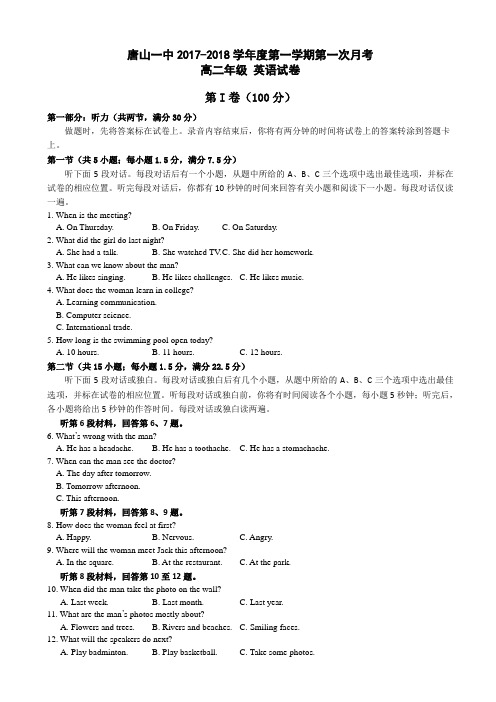
唐山一中2017-2018学年度第一学期第一次月考高二年级英语试卷第I卷(100分)第一部分:听力(共两节,满分30分)做题时,先将答案标在试卷上。
录音内容结束后,你将有两分钟的时间将试卷上的答案转涂到答题卡上。
第一节(共5小题;每小题1.5分,满分7.5分)听下面5段对话。
每段对话后有一个小题,从题中所给的A、B、C三个选项中选出最佳选项,并标在试卷的相应位置。
听完每段对话后,你都有10秒钟的时间来回答有关小题和阅读下一小题。
每段对话仅读一遍。
1. When is the meeting?A. On Thursday.B. On Friday.C. On Saturday.2. What did the girl do last night?A. She had a talk.B. She watched TV.C. She did her homework.3. What can we know about the man?A. He likes singing.B. He likes challenges.C. He likes music.4. What does the woman learn in college?A. Learning communication.B. Computer science.C. International trade.5. How long is the swimming pool open today?A. 10 hours.B. 11 hours.C. 12 hours.第二节(共15小题;每小题1.5分,满分22.5分)听下面5段对话或独白。
每段对话或独白后有几个小题,从题中所给的A、B、C三个选项中选出最佳选项,并标在试卷的相应位置。
听每段对话或独白前,你将有时间阅读各个小题,每小题5秒钟;听完后,各小题将给出5秒钟的作答时间。
每段对话或独白读两遍。
【高二英语试题精选】唐山一中2018年高二英语第二学期期末试卷(附答案)
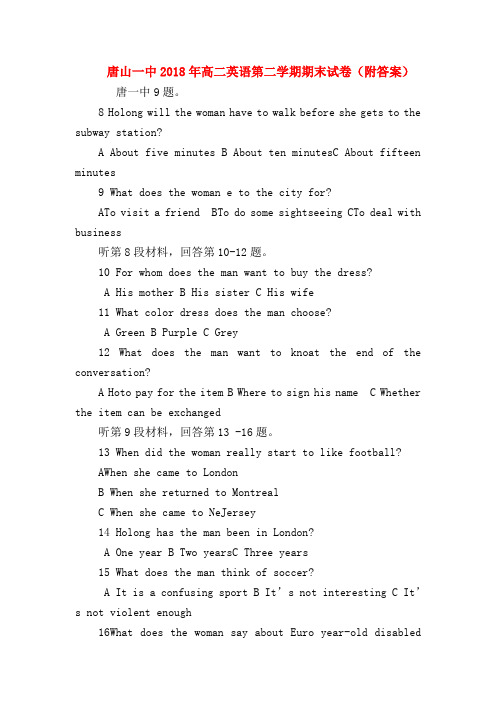
唐山一中2018年高二英语第二学期期末试卷(附答案)唐一中9题。
8 Holong will the woman have to walk before she gets to the subway station?A About five minutesB About ten minutesC About fifteen minutes9 What does the woman e to the city for?ATo visit a friend BTo do some sightseeing CTo deal with business听第8段材料,回答第10-12题。
10 For whom does the man want to buy the dress?A His motherB His sisterC His wife11 What color dress does the man choose?A GreenB PurpleC Grey12 What does the man want to knoat the end of the conversation?A Hoto pay for the itemB Where to sign his nameC Whether the item can be exchanged听第9段材料,回答第13 -16题。
13 When did the woman really start to like football?AWhen she came to LondonB When she returned to MontrealC When she came to NeJersey14 Holong has the man been in London?A One yearB Two yearsC Three years15 What does the man think of soccer?A It is a confusing sportB It’s not interestingC It’s not violent enough16What does the woman say about Euro year-old disabled。
河北省唐山一中高二英语下学期期中试题-人教版高二全册英语试题

唐山一中2016-2017学年第二学期期中考试高二年级英语试卷说明:1.考试时间120分钟,总分为150分。
2.将卷Ⅰ答案用2B铅笔涂在答题卡上,卷Ⅱ用蓝黑钢笔或圆珠笔答在答题纸上。
3. Ⅱ卷卷头和答题卡均填涂本次考试的考号,不要误填学号,答题卡占后5位。
Ⅰ卷 (选择题共100分)第一局部:听力〔共两节,总分为30分〕第一节〔共5小题,每一小题1.5分,总分为7.5分〕听下面5段对话。
每段对话后有一个小题,从题中所给的A、B、C三个选项中选出最优选项,并标在试卷的相应位置。
听完每段对话后,你都有10秒钟的时间来回答有关小题和阅读下一小题,每段对话仅读一遍。
1. What are the speakers doing now?A. Taking photos on the beach.B. Having a bath of sunshine along the beach.C. Swimming along the beach.2. Where does the conversation probably take place?A. In a department store.B. In a post office.C. At a bus stop.3. How does the woman feel about the school?A. It’s not as good as it was.B. It’s better than it used to be.C. It’s even worse than people say.4. What are the speakers talking about?A. A fireman.B. An earthquake.C. A fire.5. How will the woman get to the cinema?A. In the man’s car.B. On foot.C. By bus.第二节〔共15小题,每一小题1.5分,总分为22.5分〕听下面5段对话或独白。
精选河北省唐山一中2017年高二英语2月调研考试试题
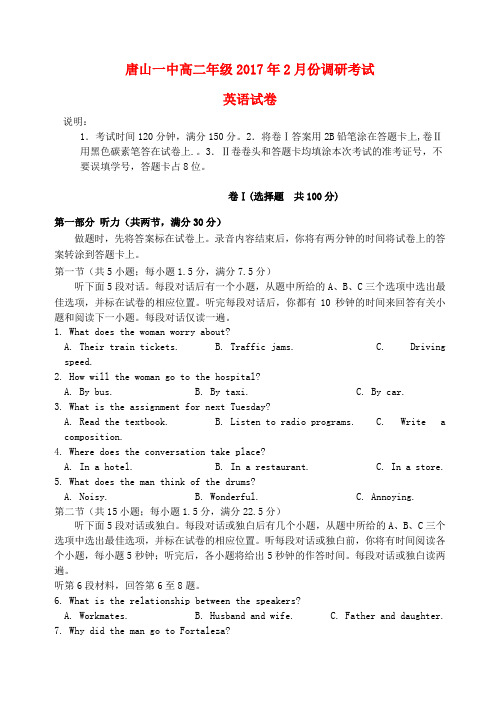
唐山一中高二年级2017年2月份调研考试英语试卷说明:1.考试时间120分钟,满分150分。
2.将卷Ⅰ答案用2B铅笔涂在答题卡上,卷Ⅱ用黑色碳素笔答在试卷上.。
3.Ⅱ卷卷头和答题卡均填涂本次考试的准考证号,不要误填学号,答题卡占8位。
卷Ⅰ(选择题共100分)第一部分听力(共两节,满分30分)做题时,先将答案标在试卷上。
录音内容结束后,你将有两分钟的时间将试卷上的答案转涂到答题卡上。
第一节(共5小题;每小题1.5分,满分7.5分)听下面5段对话。
每段对话后有一个小题,从题中所给的A、B、C三个选项中选出最佳选项,并标在试卷的相应位置。
听完每段对话后,你都有10秒钟的时间来回答有关小题和阅读下一小题。
每段对话仅读一遍。
1. What does the woman worry about?A. Their train tickets.B. Traffic jams.C. Drivingspeed.2. How will the woman go to the hospital?A. By bus.B. By taxi.C. By car.3. What is the assignment for next Tuesday?A. Read the textbook.B. Listen to radio programs.C. Write acomposition.4. Where does the conversation take place?A. In a hotel.B. In a restaurant.C. In a store.5. What does the man think of the drums?A. Noisy.B. Wonderful.C. Annoying.第二节(共15小题;每小题1.5分,满分22.5分)听下面5段对话或独白。
每段对话或独白后有几个小题,从题中所给的A、B、C三个选项中选出最佳选项,并标在试卷的相应位置。
- 1、下载文档前请自行甄别文档内容的完整性,平台不提供额外的编辑、内容补充、找答案等附加服务。
- 2、"仅部分预览"的文档,不可在线预览部分如存在完整性等问题,可反馈申请退款(可完整预览的文档不适用该条件!)。
- 3、如文档侵犯您的权益,请联系客服反馈,我们会尽快为您处理(人工客服工作时间:9:00-18:30)。
唐山一中2017—2018学年第二学期期中考试高二年级英语试卷命题人:黄蕊潘晓丽刘佳审核人:李红娜说明:1.考试时间120分钟,满分150分。
2.将卷Ⅰ答案用2B铅笔涂在答题卡上,将卷Ⅱ答案答在答题纸上。
卷Ⅰ(选择题共100分)第一部分听力(共两节,满分30分)做题时,先将答案标在试卷上。
录音内容结束后,你将有两分钟的时间将试卷上的答案转涂到答题卡上。
第一节:(共5小题;第小题1.5分,满分7.5分)听下面5段对话。
每段对话后有一个小题,从题中所给的A、B、C三个选项中选出最佳答案,并标在试卷的相应位置。
听完每段对话后,你都有10秒钟的时间来回答有关小题和阅读下一小题。
每段对话仅读一遍。
1. What color does the man prefer?A. Light blueB. YellowC. White2. What do we know about the woman?A. She has got a new job.B. She will receive some training in Hawaii.C. She doesn’t like spending her holiday in Hawaii.3. Who is the woman speaking to probably?A. A policeman.B. A friend.C. A shop assistant.4. When did the man get up this morning actually?A. At 6:00.B. At 8:00.C. At 8:30.5. Where does the conversation probably take place?A. In the theater.B. At the ticket office.C. In the shopping mall.第二节(共15小题;每小题1.5分,满分22.5分)听下面5段对话或独白。
每段对话或独白后有几个小题,从题中所给的A、B、C三个选项中选出最佳选项,并标在试卷的相应位置。
听完每段对话或独白前,你将有时间阅读各个小题,每小题5秒钟;听完后,各小题将给出5秒钟的作答时间。
每段对话或独白读两遍。
听第6段材料,回答第6至7题。
6. What is Mr. Brown doing?A. Attending a meeting.B. Making a call.C. Leaving a message.7. What does the woman ask the man to repeat?A. His position.B. His address.C. His phone number.听第7段材料,回答第8至9题。
8. Which season does the woman like best?A. Summer.B. Fall.C. Winter.9. How long has it rained?A. For two days.B. For a week.C. For two weeks.听第8段材料,回答第10至12题。
10. What does the woman think of working in IT field?A. Hard.B. Popular.C. Well-paid.11. Who is the man’s father?A. An architectural designer.B. A college teacher.C. A biologist.12. What degrees will the man get?A. Architecture design and biology.B. Architecture design and computer science.C. Biology and computer science.听第9段材料,回答第13至16题。
13. What does the woman decide to buy for her dad?A. Stamps.B. Postcards.C. Poker cards.14. Which goods among the three is the most expensive?A. The woolen hat.B. The Swiss army knife.C. The leather belt.15. How much money did the woman pay for all?A. $78.B. $108.C. $114.16. What can we learn from the conversation?A. The woman is visiting the region for the second time.B. The woman’s son is in primary school now.C. The woman buys two silk scarves for herself.听第10段材料,回答第17至20题。
17. How many people were there running the Ford Motor Company together?A. 11.B. 12.C. 13.18. When did the company develop the production line?A. In 1903.B. In 1908.C. In 1913.19. How did the production line change manufacturing according to the speaker?A. Slightly.B. Slowly.C. Greatly.20. Which of the following was the main contribution made by the production line?A. More efficiency and less cost.B. Better cars and fewer workers.C. More cars for poor families.第二部分:阅读理解(共20小题; 每小题2分, 满分40分)第一节:(共10小题; 每小题2分, 共20分)阅读下列短文, 从每题所给的四个选项(A、B、C和D)中, 选出最佳选项, 并在答题卡上将该项涂黑。
ASome time ago, I discovered that one of my chairs had a broken leg. I didn’t think there would be any difficulty in getting it mended, as there were a whole lot of antique (古董) shops near my home. So I left home one morning carrying the chair with me. I went into the first shop expecting a friendly reception. I was quite wrong. The man wouldn’t even look at my chair.The second shop, though slightly more polite, was just the same, and the third and the fourth —so I decided that my approach must be wrong.I went into the fifth shop with a plan in my mind. I placed the chair on the floor and said to the shopkeeper, “Would you like to buy a chair?” He looked it over carefully and said, “Yes, not a bad chair. How much do you want for it, sir?”“Twenty pounds,”I said. “OK,” he said, “I’ll give you twenty pounds.”“It’s got a slightly broken leg,”I said. “Yes, I saw that, but it’s nothing.”Everything was going according to the plan and I was getting excited. “What will you do with it?”I asked. “Oh, it will be easy to sell once the repair is done.”“I’ll buy it,”I said. “What do you mean? You’ve just sold it to me,”he said. “Yes, I know but I’ve changed my mind. I’m sorry; I’ll give you twenty-seven pounds for it. ”“You must be crazy,”he said. Then, suddenly the penny dropped. “I know what you want. You want me to repair your chair. ”“You’re right,”I said. “And what would you have done if I had walked in and said would you mend this chair for me?”“I wouldn’t have agreed to do it,” he said. “We don’t do repairs, not enough money in it and too much trouble. But I’ll mend this for you, shall we say for a fiver (五镑钞票)?” He was a very nice man and was greatly amused by the whole thing.21. We can learn from the text that in the first shop the writer ________.A. was rather impoliteB. was warmly receivedC. asked the shopkeeper to buy his chairD. asked the shopkeeper to repair his chair22. The expression “the penny dropped” in the last paragraph means the shopkeeper ________.A. changed his mindB. accepted the offerC. saw the writer’s purposeD. decided to help the writer23. How much did the writer pay?A.£5.B.£7.C.£20.D.£27.24. From the text, we can learn that the writer was ________.A. smartB. carefulC. honestD. funnyBNanjing and Hangzhou summer camps offeredWe are looking for hard-working and open-minded English teachers to join the Nanjing (Jiangsu Province) and Hangzhou (Zhejiang Province) summer camps!Both of the summer camps will run from the beginning of July to the end of August. You will beexpected to teach spoken English to Chinese students of different ages. We encourage you to bring your own culture to the classes to make things more interesting.The information of the Nanjing camp:● Working hours: 40 hours per week, 5 working days per week.● Salary: about 7,000 RMB per month.● Accommodation: free (single room).The information of the Hangzhou camp:● Working hours: 5 hours per day (=50 min./class × 6 classes), one day rest per week.● Salary: 20,160 RMB in total (420 RMB per day =70 RMB/class × 6 classes).● Accommodation: free (shared room).The requirements of the summer camps:● Native English speakers (US, England, Canada, Australia, New Zealand).● A university degree.● Teaching experience.Please send us your resume (简历), copies of certificates and passport if you are interested in the camps.E-mail: teacher1324@For more information you can visit our website at http: //www. Englishsummercamps. Looking forward to hearing from you soon!25. How long will a teacher work for the summer camps?A. About five weeks.B. About eight weeks.C. Less than one month.D. More than two months.26. Who might be accepted as a teacher at the summer camps?A. Abhishek, an excellent teacher from India.B. Robert, a high school student from the USA.C. Linda, an experienced university teacher from Canada.D. Jerry, a university student from Australia.27. Compared with the Nanjing camp, the Hangzhou camp ________.A. has longer working hoursB. has younger students to teachC. provides better accommodationD. pays a higher salaryCIf you want fully enjoy your vacation, you’d better check the Durban City Tours! This is actually one of the best choices in South Africa today.There is nothing more relaxing than to think about that there is a place to go and relax, right? City life is strained, but you can escape this situation and be in the place where there is nothing but relaxation. Here in Durban you will get to see all the amazing tourist attractions. If you love animals and want to see some elephants wandering around the streets, then Durban is the place to go. You can even get to ride one if you want!Here you will also get to taste all the delicious South African food. You can choose from Italian cooking to its native dishes. Durban is a great place to tour with your friends and family. You will learn a lot about its history through the landmarks you will see down the streets. Tourists a nd even the local villagers just can’t get enough of these treats!However, it is important that you make the necessary arrangements. There are actually lots of tour guides that will help you as you make your journey along the streets of Durban. But if you prefer the best tour guides here in Durban, then you’d better choose the Street Scene Tours. Their staff are all well-trained and professional. They will certainly make your stay here an unforgettable one. No wonder tourists prefer the Street Scene Tours when it comes to Durban City Tours.28. The underlined word “strained” in Paragraph 2 means ______.A. easyB. stressfulC. relaxingD. wonderful29. What is the main idea of Paragraph 2?A. Durban is a relaxing city.B. People don’t like city life.C. It is good to have a place to relax.D. One can have fun riding elephants.30. If you walk in the streets of Durban, what will impress you most?A. Tourists from all over the world.B. The buildings and many kinds of animals.C. The streets and some wandering elephants.D. The friendly local people and the scenery.31. The author wrote the last paragraph mainly to ______.A. attract tourists to DurbanB. help readers make arrangementsC. introduce the tour guidesD. persuade tourists to choose the Street Scene ToursDTo many web-building spiders, most of whom are nearly blind, the web is their essential windowon the world: their means of communicating, capturing prey (猎物), meeting mates and protecting themselves. A web-building spider without its web is like a man cast away on an island of solid rock, totally out of touch and destined to starve to death.So important is the web to an orb-web spider’s survival that the animal will continue to construct new webs daily even if it is being starved. For 16 days the starving spider builds completely normal webs. Then, as the animal gets scrawnier (憔悴的), it constructs a wider-meshed web using fewer strands (线). Such webs would only trap larger prey, which is more economical from the perspective of a starving spider.The spider stores energy by recycling web protein. It simply eats its own web each evening andre-uses it to produce new silk. In studies with radioactively labeled materials, it was found that95 percent of web protein reappears in the next day’s web. Most of the energy needed for web-building is used in walking over the strands as they are laid down.Scientists are impressed by the adaptability of the spider’s highly preprogrammed brain, whichis larger for its size than the brain of any other invertebrate (无脊椎动物). If web-building is interrupted, or if some of the existing strands are destroyed, the spider simply goes back to see where the web is left off and then finished building a normal web. One spider will even finish building the incomplete web of another.32. What is probably the best title for the passage?A. Secrets of Spiders’ AdaptabilityB. Importance of Webs to SpidersC. Secrets of the Spiders’ LifeD. Spider s’ Highly Preprogrammed Brain33. According to the passage, which of the following statements is TRUE?A. Web-building spiders have good eyesight.B. One web-building spider usually conducts one web.C. Most spiders will stop conducting webs when hungry.D. Web-building spiders will probably die without their webs.34. A spider conducts a wider-meshed web when _______.A. it is 16 days oldB. it is getting weakerC. it has fewer strandsD. it hunts for food35. A spider’s ability to finish an incomplete web proves that _______.A. it has a highly preprogrammed brainB. it reuses its web protein to reproduce new silkC. the web is everything for a spiderD. it is able to rebuild a destroyed web第二节 (共5小题;每小题2分,满分10分)根据短文内容,从短文后的选项中选出能填入空白处的最佳选项。
